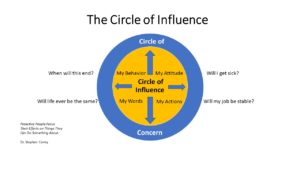By Rose O. Sherman, EdD, RN, FAAN
How do you coach nurses who are very scared and stressed? This was a question that I was asked this past week during a virtual coaching workshop. It is a challenge that many leaders are confronting in their settings. There are so many unknown unknowns with COVID-19 that it is difficult to provide staff the certainty in answers they crave to questions such as:
- Is my job secure?
- Is our health system financially healthy enough to sustain low revenues?
- Will we have enough PPE if there is a resurgence?
- Is it safe for me to continue working?
- Will I be redeployed to another clinical area because our unit volumes are low?
- When will patients come back and seek services again?
- When will things go back to normal?
The reality is that none of us can be sure of the answers to any of the questions above. What we can do to help our staff to be more resilient is to encourage them to ruminate less often over things they don’t have control over and spend their time on things that are within their circle of influence.
The concept of the Circle of Influence versus the Circle of Concern was first proposed by the late Dr. Stephen Covey in his book, Seven Habits of Highly Effective People. Dr. Covey makes the point that if we want to be proactive in a crisis rather than reactive – we will focus on the things we can control also known as our circle of influence. We need to let go of those that we can’t influence– those in our circle of concern – we care about them – we worry about them but we can’t control them.
So if we look at COVID-19 as our example of an extreme crisis and change – in our circle of influence are things like our behavior – our attitude – what we say and the actions we take every day to make our lives better. Yes, we worry about many things as part of our circle of concern but don’t control them – such as when it will end, will life be the same, will I get it or will my job be stable.
When coaching staff in a crisis – you want to help them to look at goals that are part of the circle of influence. As an example, we can’t control the reality that this is a stressful time but we can learn to manage our own behaviors in response to the stress – such as nutrition, exercise, sleep, meditation, and maintaining a positive attitude. We also know that we are more resilient when we take actions that benefit others – not only our patients but one another. Some great coaching questions to ask to promote resiliency include the following:
- What impact is your stress having on your well-being?
- What have you done in similar situations when you felt stressed?
- What behaviors are you demonstrating that show commitment to your role, professionalism, and a can-do attitude?
- What actions are you taking to maintain optimism at this time?
- What personal behaviors do you have that could be contributing to your stress and anxiety?
- What personal changes do you need to make?
- What needs to be true that is not true today in order for you to be more resilient?
- What talents and strengths do you have that could help you if you are redeployed to another area?
- Who could support you at this time in your home environment?
- What will happen if you do nothing and continue to be stressed and scared?
I would urge you to talk with staff about the Circle of Influence versus Circle of Concern as a strategy to help empower them to focus on what they can do for themselves in this situation. This is life skill that will serve them well long after COVID-19 is a thing of the past.
Read to Lead
Covey, S. (2013 Anniversary Issue). The 7 Habits of Highly Effective People. Simon and Schuster.
Read Rose Sherman’s book – The Nurse Leader Coach: Become the Boss No One Wants to Leave
© emergingrnleader.com 2020



 LinkedIn
LinkedIn Instagram
Instagram